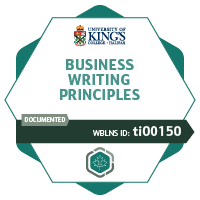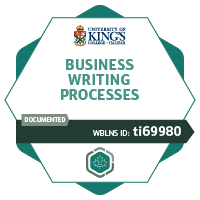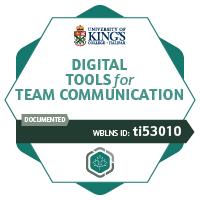Business Writing Principles (ti00150)

Get The Badge!
To pursue this training item, participants will verify they can use sound writing principles to create business communications, including narrative and corporate storytelling techniques (/ti00150).
Objective
This objective of this Training Item is to show your ability to use principles of narrative and storytelling in business communication, to integrate storytelling techniques into both written and oral communication, and to tailor business communications to engage specific audiences effectively. If you have previously demonstrated these capabilities in a professional, community or volunteer context, you may submit evidence here for Recognition of Prior Learning (RPL).
Evidence
Examples that show your learning in this area may include either workplace or civic activities, such as:
- a written marketing campaign (e.g. blog post, email series or social media content) that uses narrative to convey brand values or customer success stories.
- a presentation or pitch deck delivered to clients or stakeholders that incorporates storytelling elements (e.g. problem–solution structure, customer journey).
- testimonial letters from supervisors or clients describing how the individual used stories to engage an audience, explain a concept or influence decision-making.
- descriptive script or outline from a speech.
- training or onboarding materials created to help new staff understand company culture or values through narrative examples.
*This module is designed and aligned with the Business Administration and Management Course offered by the Chartered Institute of Management
Business Writing Processes (ti69980)
Get The Badge!
To pursue  this training item, participants will verify they understand the writing process and how to plan, draft, edit and format business communications (/ti69980).
this training item, participants will verify they understand the writing process and how to plan, draft, edit and format business communications (/ti69980).
Objective
This objective of this Training Item is to show your ability to plan, draft, edit and format professional written communications that demonstrate ethical intent, collaborative awareness and effective structuring. If you have previously demonstrated these capabilities in a professional, community or volunteer context, you may submit evidence here for Recognition of Prior Learning (RPL).
Evidence
Examples that show your learning in this area may include either workplace or civic activities, such as:
-
drafting a staff handbook, internal memo or cross-functional project proposal.
-
writing a report for leadership summarizing results, recommendations or compliance findings.
-
producing an external client proposal, service pitch or onboarding document.
-
composing grant applications or reporting templates in nonprofit or business roles.
- writing a board report for a community organization.
- preparing a newsletter or event summary for a civic initiative
- composing a policy recommendation or action brief
*This module is designed and aligned with the Business Administration and Management Course offered by the Chartered Institute of Management
Digital Tools for Team Communication (ti53010)

Get The Badge!
To pursue this training item, participants will verify they can use digital tools to manage communication, track progress and enhance team collaboration (/ti53010).
Objective
This objective of this Training Item is to show your ability to select, apply and evaluate digital tools to support effective communication and collaboration in a team or project setting. If you have previously demonstrated these capabilities in a professional, community or volunteer context, you may submit evidence here for Recognition of Prior Learning (RPL).
Evidence
Examples that show your learning in this area may include either workplace or civic activities such as:
- coordinating virtual team projects or managing communications using digital platforms (Slack, MS Teams, Asana, Trello, Monday.com).
- using Google Workspace or SharePoint for shared deliverables.
- using digital tools to organize community volunteers.
- leading virtual advocacy campaigns through online messaging platforms.
- facilitating group communications using free online tools for parent, youth, faith, non-profit groups, etc.
*This module is designed and aligned with the Business Administration and Management Course offered by the Chartered Institute of Management